Fuel Hose and Pipes Engine to Frame Rail
Removal Procedure
Tool Required
J 37088-A tool set,
Fuel Pipe Quick-Connect Separator
Caution: In order to Reduce the Risk of Fire and Personal Injury:
| • | If nylon fuel pipes are nicked, scratched or damaged during installation,
Do Not attempt to repair the sections of the nylon fuel pipes. Replace them. |
| • | When installing new fuel pipes, Do Not hammer directly on the
fuel harness body clips as it may damage the nylon pipes resulting in a possible
fuel leak. |
| • | Always cover nylon vapor pipes with a wet towel before using a
torch near them. Also, never expose the vehicle to temperatures higher than
115°C (239°F) for more than one hour, or more than 90°C (194°F)
for any extended period. |
| • | Before connecting fuel pipe fittings, always apply a few drops
of clean engine oil to the male pipe ends. This will ensure proper reconnection
and prevent a possible fuel leak. (During normal operation, the O-rings located
in the female connector will swell and may prevent proper reconnection if
not lubricated.) |
Notice: Do not attempt to straighten any kinked nylon fuel lines.
Replace any kinked nylon fuel feed or return pipes in order to prevent damage
to the vehicle.
- Relieve the fuel system fuel pressure. Refer to
Fuel Pressure Relief
.
- Clean all engine fuel pipe connections and areas surrounding the
engine fuel pipe connections before disconnecting the engine fuel pipe connections
to avoid possible contamination of the fuel system.
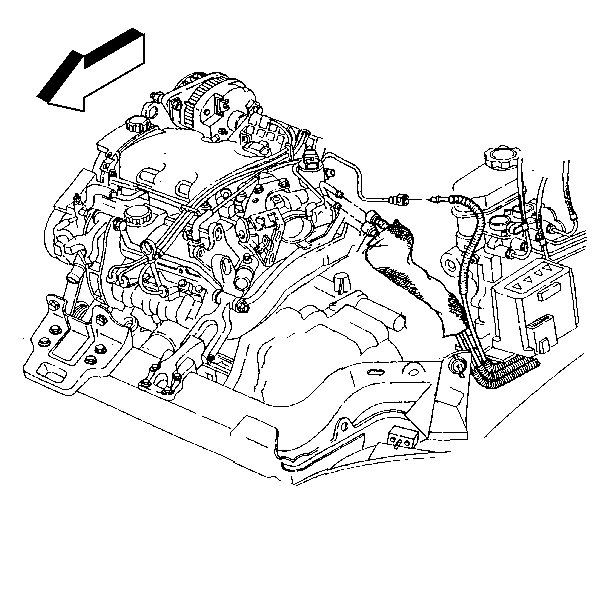
- Remove the quick-connect fittings in the engine compartment. Refer to
Servicing Quick Connect Fittings
.
- Raise the vehicle.
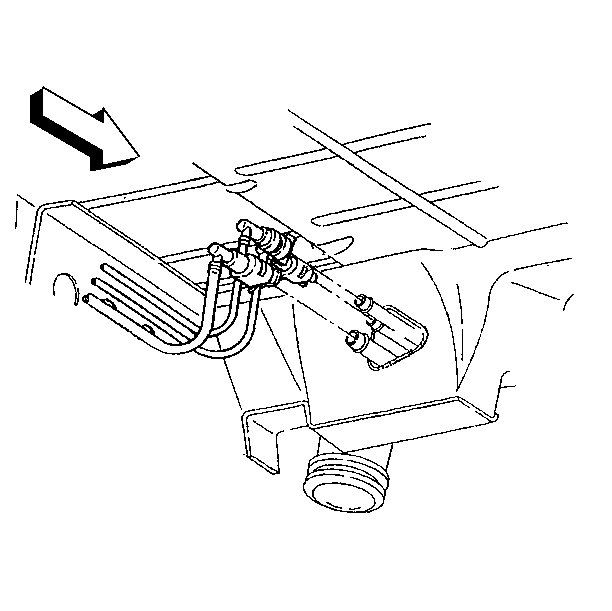
- Remove the quick-connect fitting at the front frame rail. Refer to
Servicing Quick Connect Fittings
.
- Cap the fuel feed pipe, and the fuel return pipe as needed to
stop any fuel leakage.
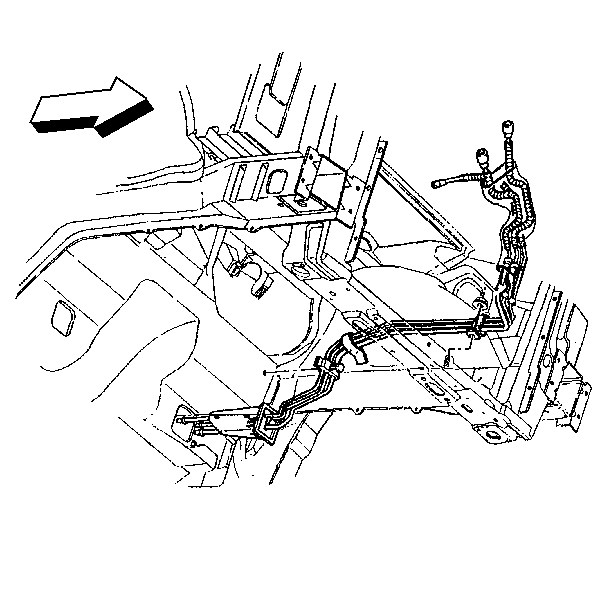
- Remove the fuel feed,and fuel return, pipe attaching hardware and the fuel
feed,and fuel return pipes.
- Note the position of the fuel feed and return pipes and the fuel
feed and return pipe attaching hardware for installation.
- Inspect the pipes for bends, kinks and cracks.
- Replace the fuel pipes if necessary.
Installation Procedure
Caution: In order to Reduce the Risk of Fire and Personal Injury: If nylon fuel
pipes are nicked, scratched or damaged during installation, they must be replaced.

- Install the new fuel feed, fuel return, pipes and the fuel pipe attaching
hardware as noted during removal.
Notice: Use the correct fastener in the correct location. Replacement fasteners
must be the correct part number for that application. Fasteners requiring
replacement or fasteners requiring the use of thread locking compound or sealant
are identified in the service procedure. Do not use paints, lubricants, or
corrosion inhibitors on fasteners or fastener joint surfaces unless specified.
These coatings affect fastener torque and joint clamping force and may damage
the fastener. Use the correct tightening sequence and specifications when
installing fasteners in order to avoid damage to parts and systems.
- Remove the caps from the fuel feed pipe, and the fuel return pipe.
- New plastic connector retainers on the fuel pipes.

- Install the quick-connect fitting at the front frame rail.
Servicing Quick Connect Fittings
.
- Lower the vehicle.

- Install the quick-connect fittings in the engine compartment Refer to
Servicing Quick Connect Fittings
.
- Add fuel and install the fuel tank filler pipe cap.
- Tighten the fuel tank filler pipe cap.
- Install the negative battery cable.
- Inspect for leaks:
| 10.1. | Turn the ignition switch to the ON position for 2 seconds. |
| 10.2. | Turn the ignition switch to the OFF for 10 seconds. |
| 10.3. | Turn the ignition switch to the ON position. |
| 10.4. | Check for fuel leaks. |
Fuel Hose and Pipes Filter to Fuel Sender
Removal Procedure
Caution: In order to Reduce the Risk of Fire and Personal Injury:
| • | If nylon fuel pipes are nicked, scratched or damaged during installation,
Do Not attempt to repair the sections of the nylon fuel pipes. Replace them. |
| • | When installing new fuel pipes, Do Not hammer directly on the
fuel harness body clips as it may damage the nylon pipes resulting in a possible
fuel leak. |
| • | Always cover nylon vapor pipes with a wet towel before using a
torch near them. Also, never expose the vehicle to temperatures higher than
115°C (239°F) for more than one hour, or more than 90°C (194°F)
for any extended period. |
| • | Before connecting fuel pipe fittings, always apply a few drops
of clean engine oil to the male pipe ends. This will ensure proper reconnection
and prevent a possible fuel leak. (During normal operation, the O-rings located
in the female connector will swell and may prevent proper reconnection if
not lubricated.) |
Notice: Do not attempt to straighten any kinked nylon fuel lines.
Replace any kinked nylon fuel feed or return pipes in order to prevent damage
to the vehicle.
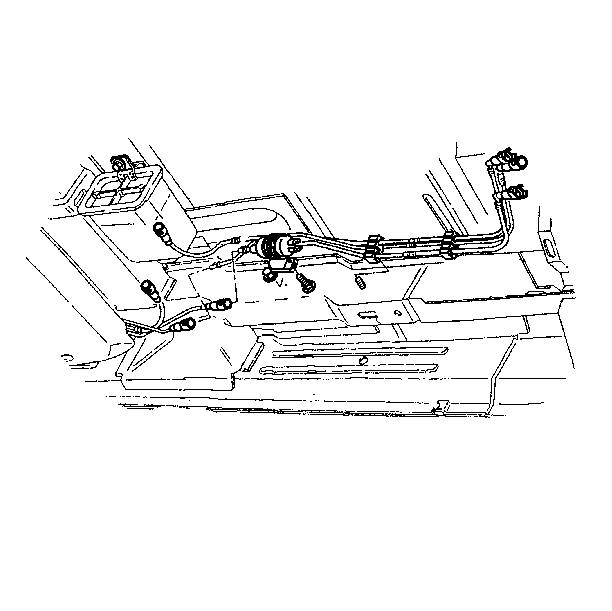
- Relieve the fuel system fuel pressure. Refer to
Fuel Pressure Relief
.
- Remove the quick-connect fittings on the fuel feed, and return
pipes at the in-pipe fuel filter. Refer to
Servicing Quick Connect Fittings
.
- Cap the fuel sender fuel pipes and the in-pipe fuel filter pipes
as needed to stop any fuel leakage.
- Drain the fuel tank. Refer to
Fuel Tank Draining
.
- Remove the fuel tank. Refer to
Fuel Tank Replacement
.

- Remove the fuel feed, fuel return pipe attaching hardware.
- Remove the fuel feed, and fuel return pipes from the fuel tank.
- Note the position of the fuel feed and return pipes and attaching
hardware for installation.
Installation Procedure
Caution: In order to Reduce the Risk of Fire and Personal Injury: If nylon fuel
pipes are nicked, scratched or damaged during installation, they must be replaced.

- Remove the caps from the fuel sender fuel pipes.
- New plastic connector retainers on the in-pipe fuel filter pipes
and on the fuel sender fuel pipes.
- Install the new fuel feed, fuel return pipes to the fuel tank
as noted during removal.
- Install the quick-connect fittings on the fuel feed, and return
pipes at the fuel tank. Refer to
Servicing Quick Connect Fittings
.
- Install the fuel pipe attaching hardware as noted during removal.
Notice: Use the correct fastener in the correct location. Replacement fasteners
must be the correct part number for that application. Fasteners requiring
replacement or fasteners requiring the use of thread locking compound or sealant
are identified in the service procedure. Do not use paints, lubricants, or
corrosion inhibitors on fasteners or fastener joint surfaces unless specified.
These coatings affect fastener torque and joint clamping force and may damage
the fastener. Use the correct tightening sequence and specifications when
installing fasteners in order to avoid damage to parts and systems.
- Install the fuel tank. Refer to
Fuel Tank Replacement
.

- Remove the caps from the in-pipe fuel filter pipes.
- Install the quick-connect fittings on the fuel feed, and return
pipes at the in-pipe fuel filter. Refer to
Servicing Quick Connect Fittings
.
- Add fuel and install the fuel tank filler pipe cap.
- Tighten the fuel tank filler pipe cap.
- Install the negative battery cable.
- Inspect for leaks:
| 12.1. | Turn the ignition switch to the ON position for 2 seconds. |
| 12.2. | Turn the ignition switch to the OFF for 10 seconds. |
| 12.3. | Turn the ignition switch to the ON position. |
| 12.4. | Check for fuel leaks. |
Fuel Hose and Pipes Engine
Removal Procedure
Tools Required
J 37088-A tool set,
Fuel Pipe Quick-Connect Separator.
Notice: Do not attempt to repair the engine fuel feed pipe or the engine fuel
return pipe. Replace a damaged engine fuel feed pipe or the engine fuel return
pipe.
- Relieve the fuel system fuel pressure. Refer to
Fuel Pressure Relief
.
- Clean all engine fuel pipe connections and areas surrounding the
engine fuel pipe connections before disconnecting the engine fuel pipe connections
to avoid possible contamination of the fuel system.

- Remove the quick-connect fittings in the engine compartment. Refer to
Servicing Quick Connect Fittings
.
- Plug the chassis fuel feed pipe and the chassis fuel return pipe
as required.
- Remove the upper intake manifold assembly. Refer to
Upper Intake Manifold
.
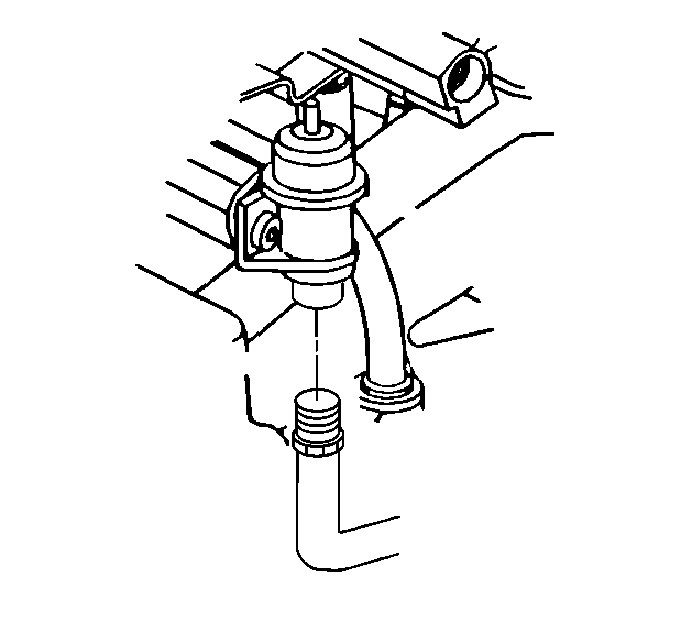
- Remove the engine fuel return pipe from the fuel pressure regulator.
Discard the O-ring.
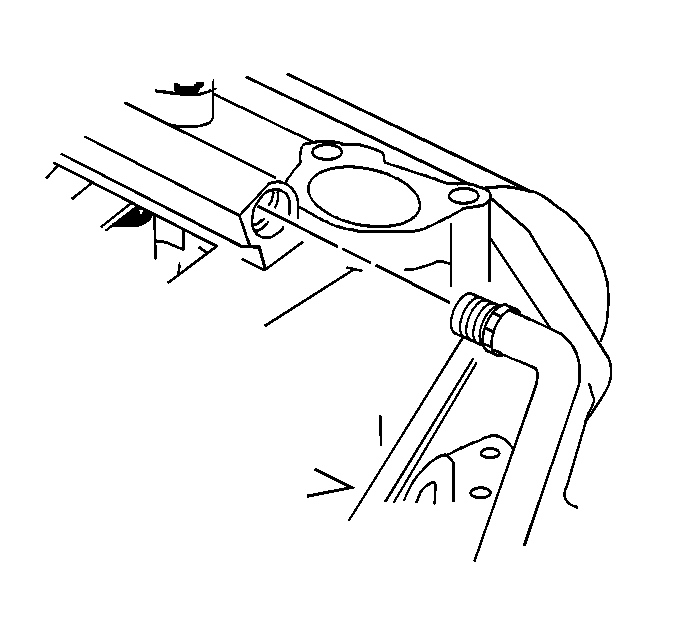
- Remove the engine fuel feed pipe from the fuel rail. Discard the O-ring.
Installation Procedure

- Lubricate the new O-ring with clean engine oil, then connect the O-ring
and the engine fuel return pipe to the fuel pressure regulator.

- Lubricate the new O-ring with clean engine oil, then connect the O-ring
and the engine fuel feed pipe to the fuel rail.
Tighten
Tighten the engine fuel pipe fittings to 17 N·m (13 lb ft).
Notice: Use the correct fastener in the correct location. Replacement fasteners
must be the correct part number for that application. Fasteners requiring
replacement or fasteners requiring the use of thread locking compound or sealant
are identified in the service procedure. Do not use paints, lubricants, or
corrosion inhibitors on fasteners or fastener joint surfaces unless specified.
These coatings affect fastener torque and joint clamping force and may damage
the fastener. Use the correct tightening sequence and specifications when
installing fasteners in order to avoid damage to parts and systems.

- Install the upper intake manifold assembly. Refer to
Upper Intake Manifold
.
- Install the quick-connect fittings in the engine compartment.
Refer to
Servicing Quick Connect Fittings
.
- Tighten the fuel tank filler pipe cap.
- Install the negative battery cable.
| 6.1. | Turn the ignition switch to the ON position for 2 seconds. |
| 6.2. | Turn the ignition switch to the OFF for 10 seconds. |
| 6.3. | Turn the ignition switch to the ON position. |
| 6.4. | Check for fuel leaks. |
Fuel Hose and Pipes Frame Rail to Fuel Filter
Removal Procedure
- Relieve the fuel system fuel pressure. Refer to
Fuel Pressure Relief
.
- Raise the Vehicle.

- Remove the fuel feed and return pipe quick-connect fittings at the front frame
rail. Refer to
Servicing Quick Connect Fittings
.

- Remove the fuel feed and return pipe quick-connect fittings at the out let
side of the fuel filter. Refer to
Servicing Quick Connect Fittings
.
- Cap the in-pipe fuel filter pipes, and the engine fuel feed pipe,
and engine fuel return pipe as needed to stop any fuel leakage.
- Remove the fuel feed and return pipes.
- Note the position of the fuel pipes for installation.
Installation Procedure
- Install the fuel feed and return pipes as noted on removal.
Notice: Use the correct fastener in the correct location. Replacement fasteners
must be the correct part number for that application. Fasteners requiring
replacement or fasteners requiring the use of thread locking compound or sealant
are identified in the service procedure. Do not use paints, lubricants, or
corrosion inhibitors on fasteners or fastener joint surfaces unless specified.
These coatings affect fastener torque and joint clamping force and may damage
the fastener. Use the correct tightening sequence and specifications when
installing fasteners in order to avoid damage to parts and systems.
- Remove the caps from the in-pipe fuel filter pipes, and the engine
fuel feed pipe, and engine fuel return pipe.
- Install new plastic connector retainers on the in-pipe fuel filter,
fuel feed, and return pipes.

- Install the fuel feed and return pipe quick-connect fittings at the outlet
side of the fuel filter. Refer to
Servicing Quick Connect Fittings
.

- Install the fuel feed and return pipe quick-connect fittings at the front
frame rail. Refer to
Servicing Quick Connect Fittings
.
- Lower the Vehicle.
- Tighten the fuel filler cap.
- Install the negative battery cable.
| 8.1. | Turn the ignition switch to the ON position for 2 seconds. |
| 8.2. | Turn the ignition switch to the OFF position for 10 seconds. |
| 8.3. | Turn the ignition switch to the ON position. |
| 8.4. | Check for fuel leaks. |




















